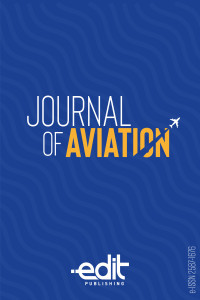Kara ve Havacılık Haberleşmeleri İle İlişkili İyonosferik HF Tahminleri Üzerine Jeomanyetik Etkiler
İyonosfer, Kritik frekans, IRI-2016, Jeomanyetik fırtınalar
Geomagnetic Effects on the Ionospheric HF Predictions Related to Ground and Aviation Communications
Ionosphere Critical frequency, IRI-2016, Geomagnetic storms, Percentile deviationIonosphere,
___
- R. W. Schunk, and A. F. Nagy, Ionospheres. New York, USA: Cambridge University Press, 2000.
- G. W. Prölss, Physics of the Earth's Space Environment. New York, USA: Springer-Verlag Press, 2004.
- A. J. Mannucci, B. T. Tsurutani, B. A. Iijima, A. Komjathy, A. Saito, W. D. Gonzalez, F. L. Guarnieri, J. U. Kozyra, and R. Skoug, “Dayside global ionospheric response to the major interplanetary events of October 29-30, 2003 Halloween Storms”, Geophys. Res. Lett., 32, L12S02-L12S06, 2005.
- B. Zhao, W. Wan, L. Liu, K. Igarashi, K. Yumoto, and B. Ning, “Ionospheric response to the geomagnetic storm on 13-17 April 2006 in the West Pacific region”, J. Atmosp. and Solar-Terr. Phys., 71, 88-100, 2009.
- D. Bilitza, “International Reference Ionosphere-Status 1995/96”, Adv. Space. Res., 20(9), 1751-1754, 1997.
- M. L. Zhang, J. K. Shi, X .Wang, S. Z. Wu, and S. R. Zhang, “Comparative study of ionospheric characteristic parameters obtained by DPS-4 digisonde with IRI-2000 for low latitude station in China”, Adv. Space Res., 33, 869-873, 2004.
- D. Bilitza, and B. W. Reinisch, “International Reference Ionosphere 2007: Improvements and new parameters”, Adv. Space Res., 42, 599-609, 2008.
- X. Wang, J. K. Shi, G. J. Wang, and Y. Gong, “Comparison of ionospheric F2 peak parameters foF2 and hmF2 with IRI2001 at Hainan”, Adv. Space Res., 43, 1812-1820, 2009.
- D, Bilitza, and B. Reinisch, “Representation of the auroral and polar ionosphere in the International Reference Ionosphere (IRI)”, Adv. Space Res., 51, 535, 2013.
- I. E. Zakharenkova, A. Krankowski, D. Bilitza, I. V. Cherniak, I. I. Shagimuratov, and R. Sieradzki, “Comparative study of foF2 measurements with IRI-2007 model predictions during extended solar minimum”, Adv. Space Res., 51, 620-629, 2013.
- D. Bilitza, “The International Reference Ionosphere: Rawer's IRI and its status today”, Adv. Radio Sci., 12, 231-236, 2014,
- S. Kumar, A. K. Singh, and J. Lee, “Equatorial Ionospheric Anomaly (EIA) and comparison with IRI model during descending phase of solar activity (2005-2009)”, Adv. Space Res., 53(5), 724-733, 2014.
- P. P. Chaitanya, A. K. Patra, N. Balan, and S. V. B. Rao, “Ionospheric variations over Indian low latitudes close to the equator and comparison with IRI-2012”, Ann. Geophys., 33, 997-1006, 2015.
- Y. J. Chuo, “Variations of ionospheric profile parameters during solar maximum and comparison with IRI-2007 over Chung-Li, Taiwan”, Ann. Geophys., 30, 1249-1257, 2012.
- D. Bilitza, “International Reference Ionosphere 2000”, Radio Sci., 36(2), 261-275, 2001.
- T. J. Fuller-Rowell, M. V. Codrescu, and E. A. Araujo-Pradere, “Capturing the storm-time ionospheric response in an empirical model in Space Weather”, AGU, 321 Washington, D. C., 393-401, 2001.
- E. A. Araujo-Pradere, T. J. Fuller-Rowell, and M. V. Codrescu, “STORM: An empirical storm-time ionospheric correction model: 1. Model description”, Radio Sci., 37(5), 269 1070-1082, 2002.
- E. A. Araujo-Pradere, T. J. Fuller-Rowell, M. V. Codrescu, and D. Bilitza, “Characteristics of the ionospheric variability as a function of season, latitude, local time, and geomagnetic activity”, Radio Sci., 40, RS5009, 1-15, 2005.
- A. O. Adewale, E. O. Oyeyemi, A. B. Adeloye, and M. B. Adedokun, “Ionospheric effects of geomagnetic storms at Hobart and comparisons with IRI model predictions”, J. Sci. Res. Dev., 14, 98-105, 2013.
- S. Kumar, E. L. Tan, and D. S. Murti, “Impacts of solar activity on performance of the IRI-2012 model predictions from low to mid latitudes”, Earth, Planets and Space, 67, 42-59, 2015.
- P. P. Chaitanya, A. K. Patra, N. Balan, and S. V. B. Rao, “Ionospheric variations over Indian low latitudes close to the equator and comparison with IRI-2012”, Ann. Geophys., 33, 997-1006, 2015.
- Space Physics Interactive Data Resource, “SPIDR”, http://spidr.ngdc.noaa.gov/spidr.
- Space Physics Data Facility, “SPDF”, https://omniweb.gsfc.nasa.gov/vitmo/iri2016_vitmo.html.
- Yayın Aralığı: Yılda 3 Sayı
- Başlangıç: 2017
- Yayıncı: Vedat Veli ÇAY
Stratejik Yönetim Kapsamında Küresel Havayolu İşbirliklerinin SWOT Analizi
Hava Hukukunun Hukuk Düzeni İçerisindeki Yeri, Yapısı ve Özellikleri
Hava Savunma Sanayinde Yatırım Projelerinin Çok Ölçütlü Karar Verme ve Hedef Programlama ile Seçimi
Bir Uçak Ana İniş Takımı Jantının Sıvı Penetrant Kontrol Yöntemi ile İncelenmesi
Türk Sivil Havacılık Sektörünün Değerlendirilmesinde Bütünleşik SWOT-AHS Yaklaşımı
Mahmut BAKIR, Hilal Tuğçe BAL, Şahap AKAN
Bahri Baran KOÇAK, Özlem ATALIK, Cem Burak KOÇAK
Kara ve Havacılık Haberleşmeleri İle İlişkili İyonosferik HF Tahminleri Üzerine Jeomanyetik Etkiler
Kablosuz Uçak İçi Eğlence Sistemi Uygulaması ve Gömülü Sistemlere Göre Analizi
Yatay Kuyruklarda Kıvrık Kanat Ucu Kullanımının Aerodinamik Etkileri
Öztürk Özdemir KANAT, Durmuş Sinan KÖRPE, Ali Osman KURBAN
